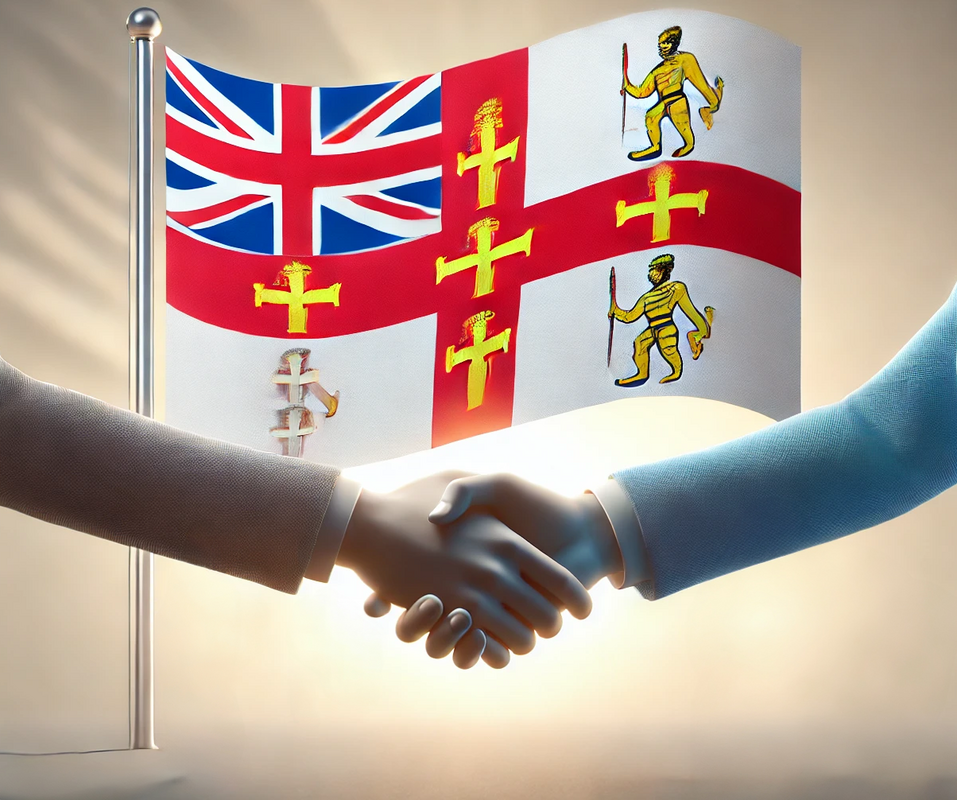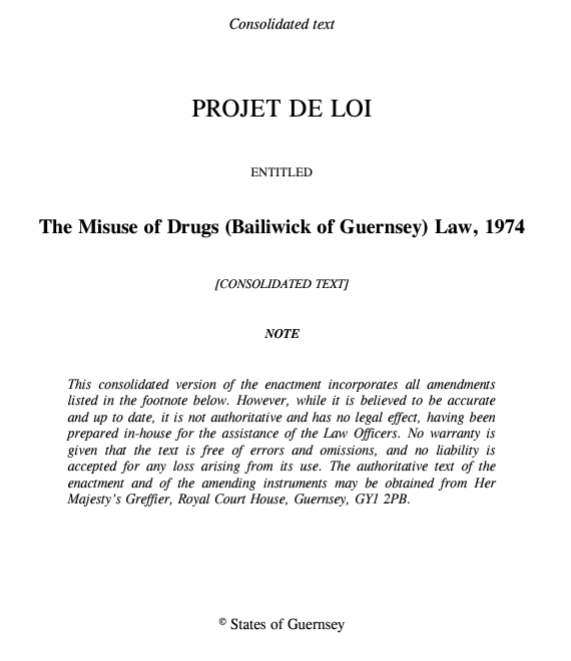
Guernsey, a picturesque island in the English Channel, is known for its unique governance structure and relative autonomy despite being a Crown Dependency. While it shares historical ties with the UK, Guernsey governs itself on most domestic matters, including healthcare, taxation, and increasingly, the regulation of cannabis. Here, we delve into Guernsey’s government structure, its cannabis laws, and the role of the UK government, particularly the Home Office, in influencing this jurisdiction.

Government Structure: The States of Deliberation
Guernsey operates under a distinctive political system with its own parliament, the States of Deliberation, which acts as the island's principal decision-making body. This body serves as the island’s parliament, handling law-making and policy development across a range of areas, from education and housing to local business regulation.
The States of Deliberation comprises 38 elected deputies who represent the citizens of Guernsey, elected every four years. The legislative body also includes two non-voting Alderney representatives—a neighbouring Channel Island—which participate in debates but are limited to matters affecting Alderney. The presiding officer of this parliament, called the Bailiff, is appointed by the Crown and chairs debates but does not engage in voting.
Instead of a traditional party system, Guernsey operates on a committee-based system. Elected deputies are allocated to different committees that manage various functions, such as health, education, and economic policy. The most prominent of these is the Policy & Resources Committee, which acts as the executive arm of the government and is headed by the Chief Minister, formally the President of the Policy & Resources Committee.
This government structure allows Guernsey to govern independently on most internal issues while still being a Crown Dependency of the UK.
Cannabis Legislation in Guernsey
As attitudes towards cannabis evolve globally, Guernsey has begun shaping its own cannabis legislation, albeit with cautious steps. Cannabis remains a controlled substance under Guernsey’s Misuse of Drugs (Bailiwick of Guernsey) Law, 1974, meaning that general recreational use, possession, cultivation, and supply remain prohibited. However, Guernsey has been proactive in regulating specific aspects of medicinal and industrial cannabis.
Medicinal Cannabis
In 2020, Guernsey allowed prescription of medicinal cannabis for specific health conditions, marking a significant shift in its drug policy. Under this framework, doctors can prescribe cannabis-based medicinal products (CBMP) provided they meet stringent pharmaceutical standards. Furthermore, residents of Guernsey can obtain prescriptions from the UK or Jersey and import these products under strict licensing arrangements.
Cannabis Cultivation and Processing
The cultivation and processing of cannabis for medical purposes are regulated under Guernsey’s licensing system, overseen by the Bailiwick of Guernsey Cannabis Agency (BGCA). Businesses interested in cultivating cannabis for use in medicinal products must apply for licenses and adhere to strict standards. This regulatory approach ensures Guernsey can explore economic opportunities in the growing medicinal cannabis market while maintaining control over production and quality.
The Influence of the UK Government and the Home Office on Guernsey
As a Crown Dependency, Guernsey holds a unique constitutional position—it is not part of the United Kingdom but falls under the British Crown. This relationship allows Guernsey extensive self-governing powers over domestic matters, although it does rely on the UK for defence and international representation.
UK Legislation and Home Office Oversight
Guernsey’s laws, including those on cannabis, are not automatically subject to UK parliamentary decisions or Home Office mandates. However, UK legislation can influence Guernsey, particularly in areas where consistency with international standards is important, such as drug classification and financial regulation. For example, the UK Home Office’s classifications of drugs and its stance on international treaties regarding controlled substances can impact Guernsey’s policy decisions, although the island is free to set its own specific regulations.
Royal Assent and Consultation on Legislation
While Guernsey’s parliament, the States of Deliberation, independently drafts and approves laws, these laws must receive Royal Assent—a formality granted by the Privy Council, which includes senior UK ministers. Although rare, the UK has the theoretical power to block legislation if it conflicts with the UK’s international obligations or poses constitutional issues. This mechanism ensures some alignment between Guernsey’s policies and those of the UK, especially in areas of shared concern, such as drug trafficking or anti-money laundering regulations.
In practice, however, the UK respects Guernsey’s autonomy, rarely intervening in its legislative processes. The Home Office and other UK government departments may provide guidance or informal consultation on certain matters, but the decision-making power largely remains with Guernsey.
International Agreements and Compliance
The UK also manages Guernsey’s compliance with certain international treaties. If the UK signs an agreement with international implications, such as the Single Convention on Narcotic Drugs, Guernsey may need to enact legislation that aligns with the treaty requirements. The Home Office could influence how Guernsey implements aspects of these treaties if they pertain to security or drug classification. However, Guernsey is typically consulted to ensure that local legislation suits its unique context.
A Delicate Balance of Autonomy and Influence
Guernsey’s self-governing framework allows it to make independent decisions in a variety of areas, including healthcare and cannabis regulation. As Guernsey’s cannabis industry evolves, particularly in medicinal and CBD sectors, the island continues to regulate cannabis with caution and under strict standards. This autonomy, however, is balanced by a consultative relationship with the UK, which respects Guernsey’s legislative freedom while ensuring that certain standards align with broader UK and international policies.
In summary, Guernsey’s cannabis legislation and government structure showcase a model of responsible autonomy, where local needs are balanced with the influence of historical ties to the UK. Through its committee-led government, careful cannabis regulations, and consultative relationship with the Home Office, Guernsey continues to navigate the complexities of modern governance as a Crown Dependency.
Published - 26th November 2024









